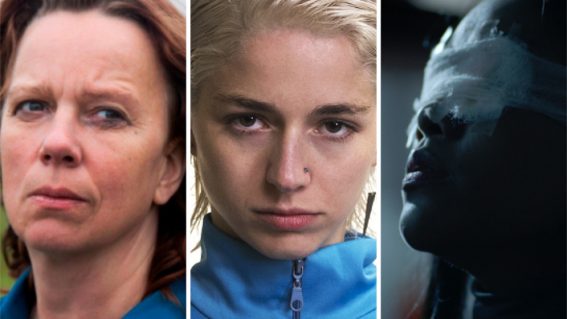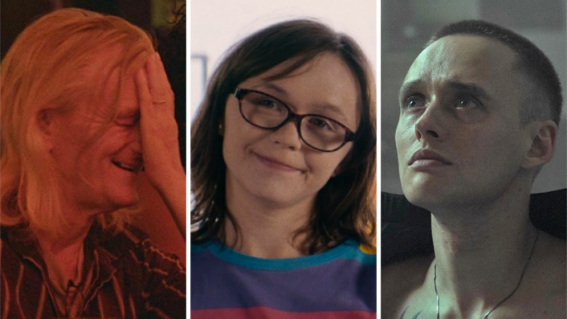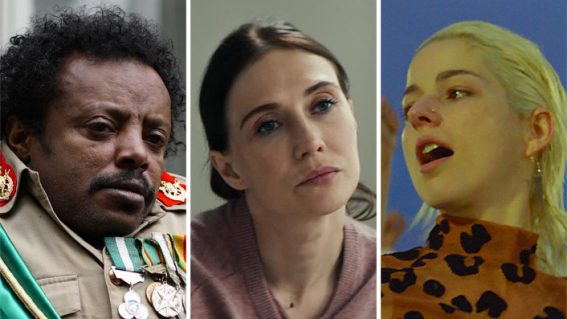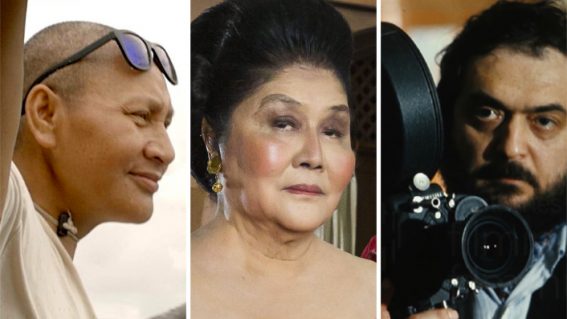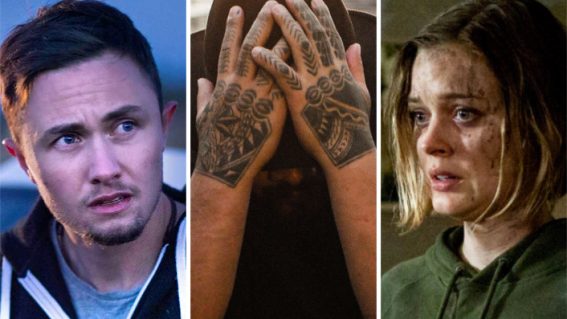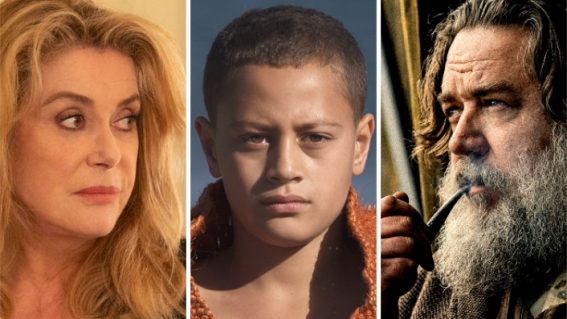NZIFF 2021 mini-reviews (S – Z)

Our writers have been watching a ton of films playing as part of Whānau Mārama: New Zealand International Film Festival 2021.
This year’s festival features plenty of gems (even if they might not all be available throughout Aotearoa). Our team of keen reviewers has been busy watching, and rendering their verdicts.
All 2021 mini-reviews:
Latest reviews | A – D | E – J | K – M | N – R | S – Z
See also:
* All our Q&As with this year’s filmmakers
* All our other NZIFF coverage
The Sadness
Oh hell yeah! This ultra-ULTRA-violent Taiwanese flick is a fantastic addition to the crazed maniacs horror subgenre. It’s not very original plot-wise, but is original where it matters: with its glorious amounts of gore. Think the Hell scenes from Event Horizon combined with the insane level of fake blood used in Braindead, but sprinkle on top the super nasty and depraved sexualised vibe of a 90s Hong Kong Category III film. Loved it. DANIEL RUTLEDGE
Well, if it’s copious amounts of blood and unflinching gore you’re after, The Sadness has you covered. Pandemic meets zombie (sorta), as Taiwan descends into ultra-violent, contagious carnage. Be warned—this is perhaps too unrelenting in sexual assault for many (the affliction “connects the area that regulates aggression to the area that governs sexual drive” we’re told long after having seen multiple, escalating instances of sadistic sexual grotesquery). Solid execution, though, if in need of a suitable conclusion. STEVE NEWALL
Signed, Theo Schoon
A basalt solid doco on the life of the legendary Theodorus Johannes “Theo” Schoon, the Dutch/Javanse maverick known mostly for his documentation of Māori cave paintings which he turned into his ‘own’ work and incredible photographs of mud pools etc starting in the1940s. The film reveals a rich and action packed backstory and some incredible archival gems. The word ‘problematic’ hangs over Theo like a norwester due to appropriation, colonial fuckery and his personality but the portrait director Luit Bieringa paints is complex and fascinating. PAUL CASSERLY
Sisters with Transistors
Laurie Anderson’s poetic narration ties together the stories of ten pioneering women in electronic music with an open-mindedness that creates a strong counter narrative to the male-dominated canon. Instead of using classic talking heads, Rovner opts for voice-over and archival interviews to give context to the stories. This serves the film well and allows the footage of the artists working to take centre stage in the storytelling process. Where the film falls down is in it’s euro-centricity; a lack of women of colour, and a strangely short segment on the mighty Wendy Carlos. However, much of this seems to be due to archival limitations, and Rovner makes a case that this film should act as an entry point into untold stories, rather than a definitive and closed history of women working in this field. RACHEL ASHBY
Stray
Ostensibly a doco about three pooches roaming the streets of Istanbul, Stray finds its moral centre in a group of refugee kids the doggos become pals with. The camera stays fixed on the puppers, but the story playing out in the background, as the boys try to eat and find a place to sleep, is as heartbreaking as the plight of our four legged friends. TONY STAMP
It’s a dog greet dog world on the streets of Istanbul, where law changes mean it’s illegal to capture or kill the ever-increasing population of strays. It’s also a world inhabited by a sadder set of strays: too-young-for-this-shit teenage Syrian refugees, homeless, and falling between the cracks of a system clearly not stacked in their favour. I wasn’t quite prepared for the emotional heft that came with following some plucky puppers around for an hour or so, but it’s well worth throwing a bone at the adventures of these waggy little rogues and their occasional human companions. Come for the doggos, leave for a change in perspective in more ways than one. [Warning: contains sex scenes, dawggy-style] MATTHEW CRAWLEY
Elizabeth Lo’s filmmaking wizardry is the closest we’ll get to a doco narrated by a canine. Never out to prove a point, the observational experience nonetheless provokes many hard-to-shake thoughts about the natural state of animals versus the bizarro human world engulfing them. Raw but rewarding with an end credit sequence that’s pure magic. LIAM MAGUREN
There is No Evil
A hugely compassionate film about everyday men who “pull the stool” under Iran’s death penalty system—many of whom are quietly forced into it. The four stories approach the topic from different angles, rewarding patient viewers with purposeful plot turns highlighting the psychological and spiritual toll these enforced actions take. Memorable and humane; the rare kind of anthology film that remains consistent throughout its running time. LIAM MAGUREN
There Is No ‘I’ in Threesome
The least erotic film about sexual relations I’ve ever seen, this movie is grotty in such an inherently New Zealand way as to be disturbing. What at first seems like a portrait of unbearable humiliation slowly morphs into something much worse. The polyamorous don’t need my defence and won’t be receiving it, but I would caveat that this film is less a portrait of a lifestyle and more a portrait of one singularly insufferable man. Personally I hated the viewing experience—numerous scenes made me feel physically ill—but I do think it has something to say about the way a documentary filmmaker can wield a narrative, and also about how psycho it is to document every moment of your life for an audience. Interesting in the way that watching a car crash in slow motion is interesting. AMANDA JANE ROBINSON
New Zealander Jan Oliver Lucks and his fiancée’s decision to film their experiment in open relationships ends up a cautionary tale. Emotionally, it turns out, polyamory can get complicated pretty quickly. When his partner leaves him, holding one half of their unfinished film, Lucks resorts to—well, let’s just say, as an experiment in form, melding fact and fantasy, it’s captivating until the final act. There may be no “I” in threesome, but there sure is a “ding” in that ending. ADAM FRESCO
With a totally bananas last minute twist that’ll leave you questioning the very nature of documentary, it feels like even saying that is maybe giving too much away. Suffice it to say, if a relentlessly intimate (penis pumps, makeshift douches, vegan cookery) portrait of a relationship in downward spiral sounds like your cup of tea, then fill your boots! AMELIA BERRY
‘Til Kingdom Come
The uneasy and frankly weird as fuck relationship between American evangelicals and Israeli Jews is explored here in a doco by an Israeli filmmaker trying to make sense of it all. As we see, “relationship” isn’t really the right word—it’s basically one way traffic as evangelicals are urged to donate to Israel which will achieve two awesome things: immediate blessings and also the acceleration of Armageddon, yay! Not didactic, instead surprisingly gentle, we’re left to draw our own conclusions (and perhaps remain as puzzled by human beings as we were before the film). STEVE NEWALL
One of the best documentaries I’ve seen this year, this is an alarming look at a shockingly large group of religious extremists encouraging bloodshed to hasten the end of the world. The Trump administration unleashed such a tsunami of horrors it’s hard to remember them all, but what it did to appease the fanatics examined in this film is right up there with the worst. The scene with a Palestinian Christian leader schooling an evangelical US pastor is particularly jaw-dropping. DANIEL RUTLEDGE
Wheel of Fortune and Fantasy
For a film with a ten minute monologue about sucking testicles, Wheel of Fortune and Fantasy is an oddly flat and ponderous affair. An anthology of three vignettes exploring the sliding doors of friendship and romance, there are some genuinely transcendent and touching moments (gazing deep into the precious and ephemeral beauty of basic human connection kind of thing). Unfortunately, in a two hour movie that is non-stop dialogue, they feel a little few and far between. AMELIA BERRY
Yellow Cat
Eat your heart out Borat, because absurdist rom-com caper Yellow Cat is the real deal, a film from Kazakhstan that’s funny, moving, and delightfully absurd. Director Adilkhan Yerzhanov delivers the tale of a love-struck, film-geek gangster, with “a girl, gun and a dream”, trying to build a cinema in the mountains of Kazakhstan. It’s a beautifully-shot, delightfully off-kilter, slow-build, arthouse, minimalist meander—encompassing comedy, tragedy, movie references galore, and enough quirk to make Wes Anderson and Aki Kaurismäki proud. ADAM FRESCO
All 2021 mini-reviews:
Latest reviews | A – D | E – J | K – M | N – R | S – Z

